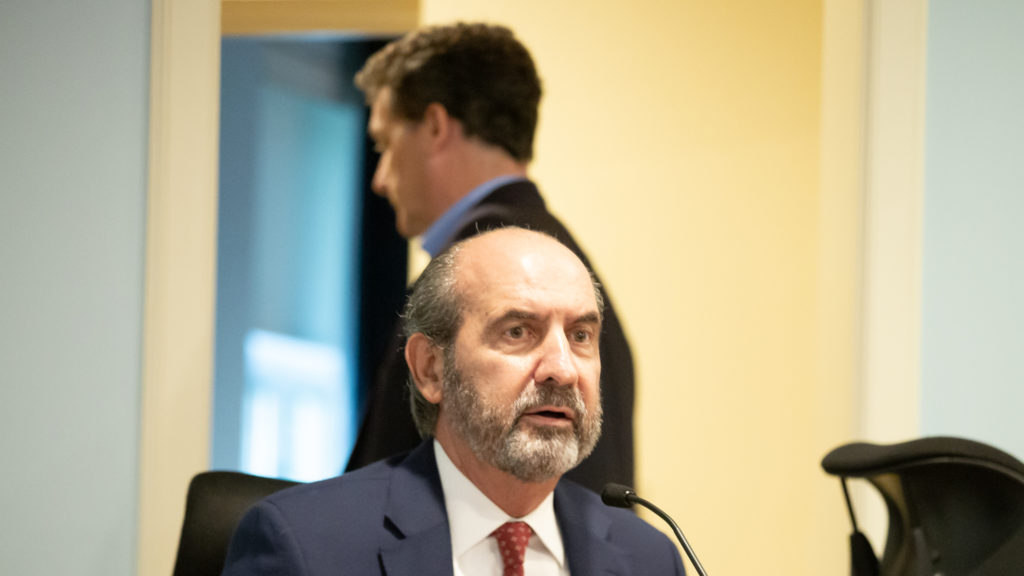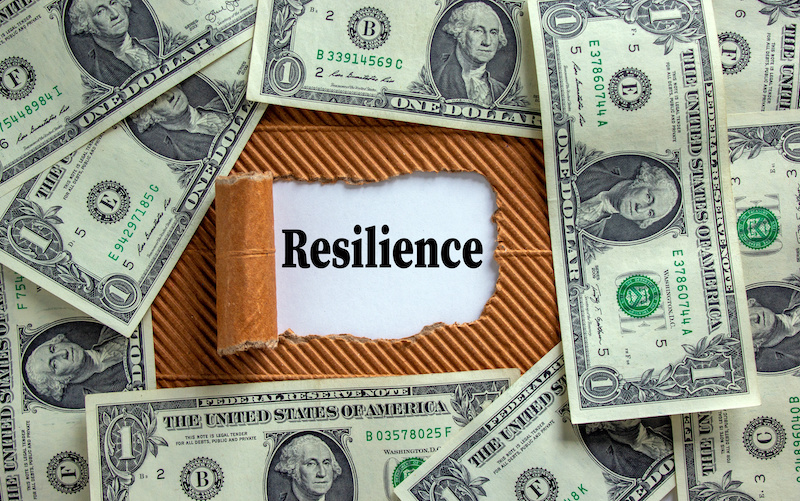Racial Profiling Comments Disrupt Key Biscayne Council Meeting
Tony WintonSeptember 16, 2019

Council Member Luis Lauredo looks to the audience as Mayor Mike Davey walks off the dais behind him. Davey declared a recess to restore order after a heated exchange about racial profiling at a meeting of the Village Council, Sept. 10, 2019. The discussion involved a recent uptick in car thefts on the island. (Key News/Tony Winton)
A dispute over racial profiling and police practices was so intense it caused an unprecedented recess to restore order at a Village Council meeting Tuesday.
The session revealed fear, anger and politics over a recent uptick in car thefts in wealthy Key Biscayne, ranked as the safest community in the state of Florida.
Thieves have stolen 11 cars in Key Biscayne so far this year, compared to 13 for all of 2018, according to police. In each case this year, keys had been left inside an unlocked vehicle, the majority of which have been recovered, authorities said.
The verbal commotion over profiling came after Mayor Mike Davey responded to an Aug. 27 remark from Council Member Luis Lauredo, who was critical of Police Chief Charles Press. Lauredo said a longstanding policy against high-speed chases demonstrated passivity and police should “let the courts decide” when it comes to profiling suspects.
“I will not profile people,” Davey said to cheers as the hearing on the 2020 budget began. “We’re a free society, and people will not be profiled because of their race, religion, their ethnicity or anything else.”
Lauredo, a former U.S. ambassador, pushed back, suggesting Davey “picked on” a resident who used the term “colored guys” without any ill intent in her address to Council. The two elected officials talked over each other repeatedly.
“I’m directing my comments to you, sir, and your comments to the police chief,” Davey said.
“Guys, guys, we don’t need this, we really don’t,” said Council Member Katie Petros, trying in vain to stop the escalating voices.
“Let me tell you, so you can be a little bit culturally sensitive,” Lauredo said. “The word ‘colored’ in Spanish translates without the racist connotations,” adding, “Let me just correct you.”
“I don’t need your corrections, sir,” Davey shot back, pounding the gavel four times before announcing, “That’s enough! We’re in recess.”
For about 10 minutes, stunned residents milled about, wondering what they had just seen in the deliberative chambers of one of the wealthiest communities in the nation. Some ducked into bathrooms in disgust. Others hid in the audiovisual control room.
The meeting resumed, but further discussion of the police budget will come Sept. 24. Lauredo said he will raise law enforcement policy again.
“Any council member has the right to ask questions and review policy,” he said. “This is public safety.”
Chief Press reiterated his stance that officers will follow nationally recommended policies on high speed chases and will also adhere to court rulings prohibiting racial profiling. The department’s policy is posted on its website.
Press, who also leads the community’s sister city relationship with the Liberty City neighborhood, said he isn’t going anywhere.
“I love being the police chief in Key Biscayne. I’m proud of the job I’ve done and I’m proud of the job my officers have done.”
He said he is mindful of resident frustration over the recent thefts.
“I would never blame the victim,” he said, describing the intense frustration officers feel when a suspect gets away. “We wish we could get them all.”
Policing and Race Issues
Tensions over race and high-speed chases have roiled many communities in South Florida. Since 2016, City of Miami police operate under the terms of a federal consent decree that settled allegations of excessive force made by the U.S. Justice Department. Compliance with the settlement continues to be monitored by an outside reviewer.
In July 2018, the American Civil Liberties Union of Florida studied racial disparities in law enforcement throughout Miami-Dade County, concluding that “Black Hispanic defendants experience significantly more punitive outcomes at multiple stages than do White Hispanic defendants.”
The ACLU of Florida said it was reviewing a tape of the Key Biscayne meeting after being asked for comment.
Pursuit Policy
Since at least 1990, the U.S. Justice Department has encouraged law enforcement agencies to develop high speed pursuit policies, saying chases are the most dangerous routine job that officers do.
In 2015, USA Today analyzed decades of police car chases, finding more than 5,000 bystanders and passengers had been killed since 1979. Tens of thousands more were injured. Most bystanders were killed in their own cars by a fleeing driver, the paper found. More recent reporting by the nonprofit investigative site Fair Warning said that in 2017 alone, 416 people were killed in police pursuits.
Press said Key Biscayne’s chase policy follows that of other Miami jurisdictions. It was also reviewed this month by Chuck Wexler, executive director of the Police Executive Research Forum, a nonprofit research and policy organization.
“This is an excellent pursuit policy,” Wexler wrote to Press. “You can say we support it,” he said.
Editor’s Note: An earlier version of this story did not include a comment from Mr. Lauredo.



Responses
Charles Sherman
Sep 16
Tony Winton should be applauded for his colorfully detailed account of the brouhaha. We need more reporting along these lines.
The comments are closed.